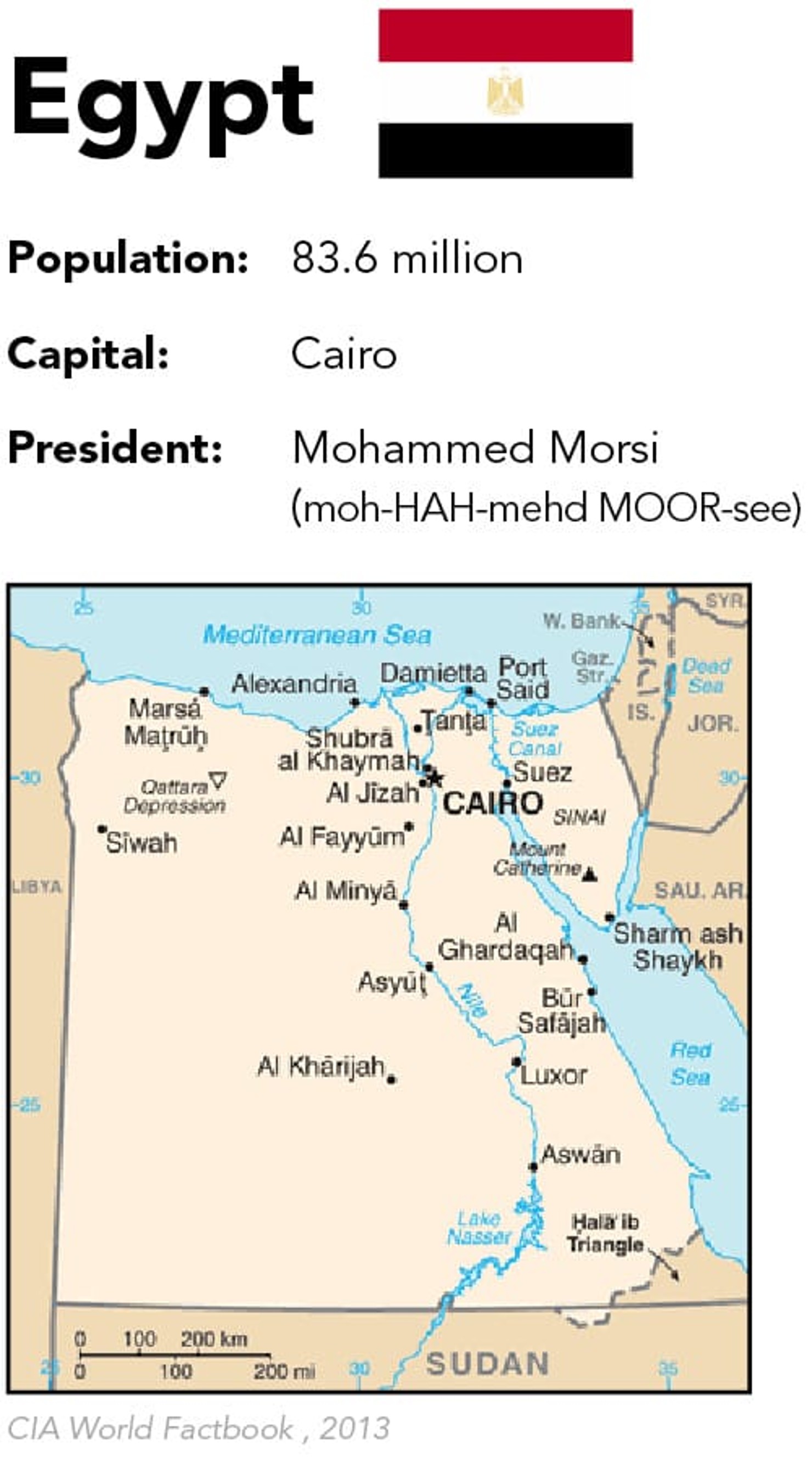Report Published February 1, 2013 · Updated February 1, 2013 · 5 minute read
Egypt Country Brief
Mieke Eoyang & Aki Peritz
Egypt, the most populous country in the Arab world, is in the middle of a slow-moving, messy evolution toward democratic rule. After longtime strongman Hosni Mubarak was deposed during 2011’s Arab Spring, long-stifled political voices have emerged—and many of them are not sympathetic toward American security interests. The deep religious, social, and economic cleavages within Egyptian society are again turning into major political struggles that threaten the country’s stability.

The Muslim Brotherhood
Egypt’s current dominant political actor is an organization called the Muslim Brotherhood (MB), led by President Mohammed Morsi.
- Founded in 1928 in order to oppose British rule in Egypt, MB is a conservative, political-religious movement that has over the decades been both brutally suppressed and quietly encouraged as a counterweight to more radical political movements by successive Egyptian governments.1
- MB has a history of violence and extremely conservative views on many subjects, including the role of women, the status of Egypt’s Coptic Christian minority, and attitudes toward the U.S., Great Britain, and Israel.2 However, MB renounced violence in the 1970s and since coming to power, Morsi has left the relationships with other countries intact.
While some of its members are extremely conservative, MB is not the most fundamentalist organization in the Egyptian political landscape.
- Nonetheless, MB has spawned violent regional groups, like the Palestinian terrorist group Hamas.
- Al Qaeda routinely denounces MB as apostate because it has participated in national elections for over a decade.3
Muslim brotherhood and the Arab Spring Aftermath
Although it was young, secular activists who led the public mass protests that toppled Mubarak, the Muslim Brotherhood has nonetheless emerged as the most powerful organization in Egypt’s new government.
- In 2012, Morsi narrowly won the presidency and MB’s “Freedom and Justice Party” won a plurality (47%) of the seats in parliament. Additionally, an even more fundamentalist strain of political Islam, the Salafists, won nearly 25% of the seats.4 Fearing a religious takeover of the government, the Egyptian military tried—and failed—to dissolve parliament in June 2012.5
- A MB/Salafist-dominated parliament chose an Assembly to draft a new constitution, but when it seemed likely that independent courts would invalidate the Assembly, Morsi declared his executive decisions exempt from judicial review. Many Egyptians viewed this as a naked power grab, sparking riots in Cairo and elsewhere.6
- A national referendum approved the Assembly’s constitution, but opposition groups have been charging that the vote was obtained fraudulently.
- Political turmoil continues to rock Egypt. In late January, Morsi declared a state of emergency and a curfew after clashes between rioters and police in Port Said—at the mouth of the Suez Canal—turned deadly.7 It remains unclear whether Morsi’s civilian government will remain in power for the long term.
Egypt, the U.S., and the Region
As the largest country in the Arab world, Egypt is a critical player to any American effort in the region. Egypt has been the traditional center of Arab culture and Muslim learning, which is why President Obama made his 2009 “A New Beginning” speech in Cairo.8
- Egypt has been a decades-long recipient of American military aid. Despite some misgivings with the current political situation, President Obama requested $1.5 billion in his FY13 budget for military and economic aid for the country.9
- After recent attacks on the American Embassy in Cairo in September 2012, some Members of Congress criticized authorizing additional funds to aid Egypt. However, the Department of State countered that funds used to support and buttress democracy is what young governments need to establish stability.
- Egypt is one of the few Arab countries that signed a peace treaty with Israel.10 Despite concerns that this stance would change, these policies have continued and Morsi helped broker an Israel-Hamas ceasefire in 2012.11
Egypt’s Fragile Economy
The global economic downturn and a lukewarm investment climate continue to batter Egypt. While Cairo controls an important global economic chokepoint—the Suez Canal, where 8% of the world’s commerce passes—Egypt’s economy is still sputtering.12
- The World Bank in September 2012 noted Cairo’s largest challenges include restoring market confidence and tackling Egypt’s chronically high youth unemployment. Furthermore, Egypt is running a large budget deficit despite the government’s pledge to devote more funds to public spending.13
- Before the revolution, tourism accounting for at least 10% of the economy. Since then, tourism has slumped, causing further economic dislocations within the country.14
- Due to these problems, Egypt is also having a problem servicing their IMF loans and maintaining a level of foreign currency reserves.15
With the departure of the resolutely pro-American Mubarak government, the U.S. will need to forge new alliances with the current democratically-elected government. Despite reservations about the MB, American policymakers must appreciate that they are firmly part of the Egyptian political landscape.

